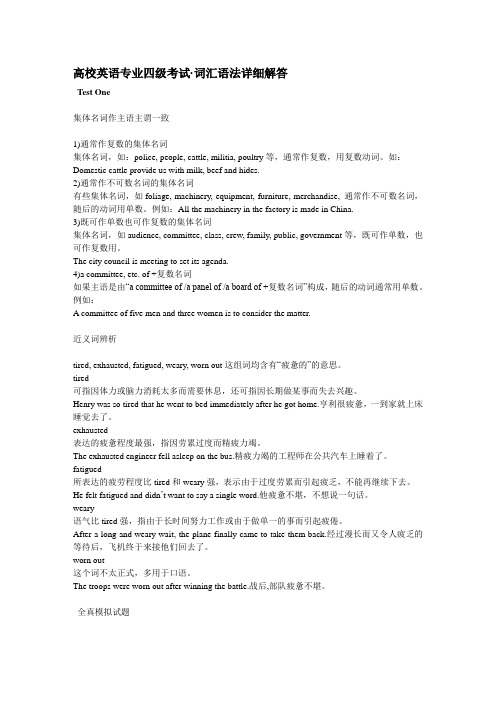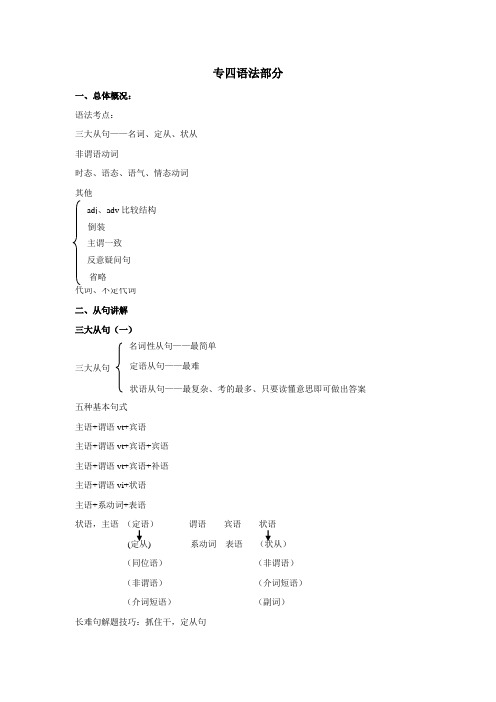完整版专四英语语法考点分析解析
- 格式:doc
- 大小:106.00 KB
- 文档页数:14

专四常考语法点汇总精编W O R D版IBM system office room 【A0816H-A0912AAAHH-GX8Q8-GNTHHJ8】语法与词汇专项语法核心考点一:从属分句复合句= 主句+从句(1个或1个以上)要点1从属分句是复合句必不可少的组成部分,以语法功能作为分类标准,从属分句可以分为状语从句、关系从句(即定语从句)和名词性从句。
其中状语从句可分为时间、地点、原因、结果、程度、目的、条件、让步和方式等;名词性从句可分为主语从句、宾语从句、表语从句、同位语从句。
要点2 状语从句的考点集中在方式、条件、让步、方式和时间状语从句上;关系从句的考点集中在关系代词的选择,限制性定语从句和非限制性定语从句的区别;名词性从句的考点集中在宾语从句和同位语从句。
一状语从句状语从句真题剖析:1 Nine is to three _____ three is to one. (2008, 53)A. whenB. thatC. whichD. what2 ______ he wanted to go out with his friends at the weekend, he had to stay behind to finish his assignment. (2008, 55)A. Much thoughB. Much asC. As muchD. Thouth much3 Men differ from animals ____ they can think and speak. (2008, 54)A. for whichB. for thatC. in thatD. in which4 They stood chatting together as easily and naturally as ____. (2008, 60)A. it could beB. could beC. it wasD. was5 The couple had no sooner got to the station ______ the coach left. (2009,60)A. whenB. asC. untilD. than6 ____ the boss says, it is unreasonable to ask me to work overtime without pay. (2010,55)A. WhateverB. WheneverC. WhicheverD. However7 Fool ____ Jerry is, he could not have done such a thing.A. whoB. asC. likeD. that8 He asked me to lend him some money, which I agreed to do, ___ that he paid me back the following week. (2005)A. on occasionB. on purposeC. on conditionD. only if9 Which of the following contains an adverbial clause of cause?A. I got a job as soon as I left university.B. As there was on answer, I wrote again.C. You must do the exercise as I show you.D. Wealthy as he is, Mark is not a happy man.状语从句重点总结:(一)条件状语从句:表示条件或假设,通常由以下连词或结构引导:★特别提醒几种不常用的条件状语从句举例:In the event that she can not arrive on time, we will go first. Suppose it snowed, we would still go.Say what he said were true, what would you do about it?(二)让步状语从句:含有“虽然,尽管,即使”之意,主要引导词有:★特别提醒1. 几种不常用的让步状语从句举例:In spite of the fact that he was deaf and dumb, he had a genius for music. While the grandparents love the children, they are strict with them.Much as she needed the job, she had to refuse.For all that there were a lot of difficulties, he finally entered the final competition and won.Granted you have made much progress, you should not be conceited.2. 用了although或though,就一定不能再后面的从句中同时用but,但是though可以和yet 连用。
![英语专业四级考试语法精讲[1]](https://img.taocdn.com/s1/m/a66f1368561252d380eb6e8d.png)
英语专业四级考试—语法精讲虚拟语气第一部分:概述虚拟语气类型(宾语从句;状语从句;名词性从句(主语从句,同位语从句,表语从句);定语从句;特殊类型(感叹句);省略if 的虚拟法(倒装))ExamplesThe rapid change of society requires that college students adapt to the world outside campus by getting to know the society.I would rather that you did nothing for the time being.I wish that I were a student again.I wished that I had followed his suggestion.名词性从句中的虚拟主语从句(it is +adj./p.p that)同位语从句(The +n. that )表语从句(n. +be that)省略if 的虚拟法(倒装)(1)虚拟语气中如果从句引导词if / whether 省略,从句中需要倒装,提前助动词(系动词)或情态动词。
Eg. If it should rain tomorrow, we would not be able to have the sports meeting.=Should it rain tomorrow, we should not be able to have the sports meeting.省略if 的虚拟法(倒装)(2)Eg. Whether it (may) be fine or rainy, we would have the sports meeting. =Be it fine or rainy, we would have the sports meeting.If she had been given more information, she could have answered the questions.=Had she been given more information, she could have answered the questions.第二部分详解&总结虚拟语气的动词标志―insist, suggest, require, request, demand, propose, prefer, maintain, move,urge, recommend, command, order‖等动词表“建议、愿望”时,其后宾语从句中谓语动词要用虚拟语气。

高校英语专业四级考试·词汇语法详细解答Test One集体名词作主语主谓一致1)通常作复数的集体名词集体名词,如:police, people, cattle, militia, poultry等,通常作复数,用复数动词。
如: Domestic cattle provide us with milk, beef and hides.2)通常作不可数名词的集体名词有些集体名词,如foliage, machinery, equipment, furniture, merchandise, 通常作不可数名词,随后的动词用单数。
例如:All the machinery in the factory is made in China.3)既可作单数也可作复数的集体名词集体名词,如audience, committee, class, crew, family, public, government等,既可作单数,也可作复数用。
The city council is meeting to set its agenda.4)a committee, etc. of +复数名词如果主语是由“a committee of /a panel of /a board of +复数名词”构成,随后的动词通常用单数。
例如:A committee of five men and three women is to consider the matter.近义词辨析tired, exhausted, fatigued, weary, worn out这组词均含有“疲惫的”的意思。
tired可指因体力或脑力消耗太多而需要休息,还可指因长期做某事而失去兴趣。
Henry was so tired that he went to bed immediately after he got home.亨利很疲惫,一到家就上床睡觉去了。

专四语法部分一、总体概况:语法考点:三大从句——名词、定从、状从非谓语动词时态、语态、语气、情态动词其他二、从句讲解三大从句(一)三大从句五种基本句式主语+谓语vt+宾语主语+谓语vt+宾语+宾语主语+谓语vt+宾语+补语主语+谓语vi+状语主语+系动词+表语状语,主语(定语)谓语宾语状语(定从) 系动词表语(状从)(同位语)(非谓语)(非谓语)(介词短语)(介词短语)(副词)长难句解题技巧:抓住干,定从句逗号原则:在英语句子中,逗号是不能连接两个独立完整的句子的。
名词性从句三大从句(二)两步解题法1.抓连词2.状从中的连接词——常考固搭so…that in order that such…that with the result that so thatthat引导名词性从句——that+完整句子(1)主语从句e.g. It is true that he passed the exam.It is said that he passed the exam.It is a pity that he didn’t pass the exam.强调句式It is/was+被强调部分+that+不完整句子主、宾、表、状e.g. I met him in the street.It was him that I met in the street.It was in the street that I met him.(2)宾语从句主+谓语vt+(that)+完整句子e.g. I know (that) he passed the exam.(3)表语从句主+系动词+that+完整句子e.g. My suggestion is that he go with us tomorrow.(4)同位语从句抽象名词+that+完整句子e.g. My suggestion that he go with us tomorrow.There is/are +抽象名词+that+完整句子Answer,belief,concept,conclusion,decision,discovery,doubt,evidence,sign,fact,hope,idea,informati on,knowledge,suggestion,thought,probability…On the condition that…Despite the fact that…On the understanding that…that 引导限定性定从all some any one(s) every each…the first the lastthe only the veryn+that+不完整句子作从句中的主、宾、表语e.g. The book that was written by him is pop.that引导同位语从句抽象名词+that+完整句子that 引导限定性定从n+that+不完整句子作从句中的主、宾、表语The fact that he passed the exam was true.The fact that he found was true.三大从句(三)What=all that; the thing that; the person thatWhat 只引导主从、宾从、表从,不能引导定从和同位从What+不完整句子What he said made me happy.e.g. _____it turned out,it was Italian movie.A What_____it turned out was Italian movie.A WhatI know what he said.I listen to what he said.This is what he said.词______+ 不完整句子n A what Xvt/介词/系动词 A what 可以考虑词,_______+不完整句子A whatB whichC thatwhat 与how 的区别I don’t know what to do.I don’t know how to do it.I’m thinking of ______to do about it.A.whatB. how介词短语在句子的位置1)作状语句子+介短/介短+句子2)作定语n+介短3)作表语系+介短wh—ever与no matter wh—区别让步、名从让步I don’t believe whatever he said.Whatever happens,don’t panic.公式however + adj/adv + 主语+ 谓语e.g. It caused them to think about _______they might control the experiences of children to duce responsible and productive adults.A. whatB. howC. whateverD. however if 与 whether 的区别 if_______about the university the mind, love, dreams, or ordering a drink. A) whatB) whether C) while D) if Never ask a child _______he likes or dislikes.A) what B) whether C) that D) which We know, however,________ no two places are exactly the same. A) Although B) whether C) since D) that 三大从句(四) 定语从句两步解题法1. 抓先行项(指人、物、整句话内容)2. 抓关系词在定语从句中的成分e.g. This is the house_______①I once lived.②I once visited.①where/in which②that/which/xThis is the very house_________ I once visited.e.g. I’ll never forget the day______①I met him.②I spent with him.①when/on which②that/which/xI’ll never forget the very day______ I spent with him. 地点n where 主+谓vt+宾/宾/宾补主+谓vi主+系+表时间n when 主+谓vt+宾/宾/宾补主+谓vi 主+系+表the reason why 主+谓vt+宾/宾/宾补 主+谓vi 主+系+表 三大从句(五)Which 在专四考试中,只考定语从句。

一、语法部分考查重点1、虚拟语气的考点为: would rather+that从句+一般过去时;It is vital/ necessary/ important/ urgent/ imperative/ desirable/advisable/ natural/ essential+that+(should)动词原形;proposal/suggestion+that+动词原形;It is time/about time/high time+that+一般过去时;lest+that+should+动词原形;if only+that+would+动词原形。
2、状语从句的考点为:非if引导的条件状语从句,此类句子多用at times,provided,so long as,in case,once等来替代if;由even if/so,now that,for all等引导的让步状语从句;just/hardly...when引导的时间状语从句;more than,as...as,not so much as,the same as,as much as等引导的比较状语从句。
3、独立主格结构多以逻辑主语+分词的形式出现。
4、情态动词多与完成时形式连用。
5、定语从句重点考查介词+关系代词(which)和as作为关系代词。
二、词汇部分考查重点1、动词、名词与介词的搭配如:popular/patient+with;yield/solution/adapt/transfer/access+to;accuse/require+of;charge+for;under+discussion等等。
2、习惯用法如:confess to/set about/be used to+doing;be supposed to/have/make sb.+do等。
3、由同一动词构成的短语如:come,go,set,break等构成的短语。

专四语法重点总结一、代词、名词、数次1. 在使用两个以上的人称代词时顺序是:第二人称第三人称第一人称2. everyone后面不可以跟of短语every one 就可以3. 以‘名词/动名词+介词(短语)/形容词/副词/动词不定式’构成的复合名词,它的复数形式是将作为主要部分的名词或动名词变为复数直接来源于短语或以可数名词结尾的复合名词的复数形式是将最后一个构词部分变为复数以‘man 或者woman+名词’构成的复合名词的复数形式是将两个组成部分全变成复数以不可数名词结尾的复合名词无复数形式如:homework4. 物质名词一般不可数,但用于表示‘各种不同品种’时几乎都可做可数名词如:different teas5. 当抽象名词前后有修饰语表示‘某一种’或‘某一方面’的抽象概念时其前可加a/an6. 名词所有格要点:必须用’s的场合1 )’s属格用于表示时间,度量衡,价值的名词之后2 ) 作为一个整体的词组在最后一个词加’s3) 人或物为两人共有,在第二个名词后加’s4 )当所有格后面的名词是人们熟悉的建筑物如商店,住家,教堂,医院等,此名词常省略5) 复合名词在最后一个词后加’s6) 当被修饰的名词后有同位语时,必须用’s7) 当用来表示类别或属性时,要用’s children’s shoes 儿童鞋必须用of的场合1) 名词后跟有后置修饰语或同位语时2) 以定冠词加分词或形容词表示一类人时7. 如果dozen/score/hundred/thousand/million前有基数词以表示确切数目时,都不能用复数形式如果用来表示很多有不确切的数目时,须用复数,而且后面加of8.表示顺序的两种方式:1)‘名词+基数词’,不用冠词,如Chapter four2) ’the+序数词+名词‘如the Fourth Chapter9. 倍数增减的表示法1) 倍数+形容词/副词比较级+than2) 倍数+as+形容词/副词+as3) 倍数+名词4) 动词+百分比或倍数5) 动词+to+数词6) double/triple/quadruple+名词7) 动词+by+数词/百分比/倍数10. 分数分子为基数词,分母为序数词分母除了在分子为一的其他情况下为复数11. 百分比后接名词时加of二、形容词、副词1 前置修饰语的排列顺序可以置于冠词前的形容词(all both such) -----冠词,指示形容词,所有格形容词,不定形容词(a an the this your his any some)-----------基数词(one ) 序数词(first)------------ 表示性质,状态,质量的形容词(good useful)--------------表示大小,长短,形状的形容词----------------表示年龄,新旧,温度的形容词------------表示颜色的形容词---------------------表示国籍,产地,区域的形容词-----------表示材料,用做形容词的名词----------动名词,分词2.后置修饰语由前缀a-构成的形容词3.形容词修饰由some-,any-,every-,no-,-body,-one,-thing等组成的复合不定代词时,必须后置4.enough作形容词修饰名词时既可放前又可放后,但当它作副词修饰形容词或副词时,必须后置5.有些形容词本身就有‘比……年长’,‘比……优等的意思这些形容词后面用介词to 而不用than6.much too 作为副词短语修饰形容词或副词,不修饰名词7.more 不能用来修饰比较级8.与名词连用的more of a .. ./ as much of a... / more of a.... 意为更像……9.as much of a……意为称得上,less of a 意为算不上10.none other than(不是别人,正是)=no other than11.any/sone/every与other连用时,其后若用可数名词,一般为单数三、情态动词、虚拟语气1.can 用于否定句cannot(help)but表示不能不,只能(but后跟不带to的动词不定式)2.must 表示禁止,一定不要时的否定式为mustn’t 当它表示有把握的推断时意为一定准是时它的否定形式为can’t3.need doing=need to be done 这个句型表示被动意味4.need not have done sth 表示本来没有必要做某事(经常考)虚拟语气1.It is (high/about/the)time... 谓语动词用过去式指现在或将来的情况表示早该做某事而现在已经有点晚了2.It is the first(second/third)time后的that从句中,谓语动词要用完成体来表示一种经验3.as if/though 的虚拟要点1) 对当时事实的假设,从句谓语用过去式,be动词一律用were2)对过去事实的假设,从句谓语用过去完成式3)对未来事实的假设,从句谓语用would+动词原型五、比较级比较等级的含义:英语中形容词与副词有三个比较等级,即原级,比较级和最高级。
专四语法全析时态1.一般现在时一般现在时表示将来时间,往往用在时间状语从句或条件状语从句中,也就是我们经常说的“主将从现”。
If she doesn’t tell him the truth now, he’ll simply keep on asking her until she______.(CET4-9806)A.doesB. has doneC. will doD. would do2.现在进行时①现在进行时表示现阶段正在进行的动作Mr. White works with a chemicals import & export company, but he____ for this industrial fair, since he is on leave. (TEM4-1997)A.has workedB. worksC. has been workingD. is working②现在进行体表示感情色彩现在进行体常与always, continually, constantly, perpetually, forever等,表示“总是”、“继续不断地”等频度状语连用,带有浓厚的感情色彩,表达说话人不满、不耐烦等情绪。
How can I ever concentrate if you____ continually____ me with silly questions?(TEM4-1997)A.have…interrupted C. a re…interruptingB.had…interrupted D. were…interrupting③ be+being + 形容词状态动词be的进行时态(be being)后面接行为形容词brave, careful, stupid, clever, foolish, polite, kind和shy等,表示主语所表现的非一贯性特点或故意的行为或暂时出现的平时所没有的某种特质。
语法考点之一:虚拟语气考点1. If从句中的虚拟语气1、与过去事实相反:从句sb had done,主句sb would(should, could, might)+ have done;2、省略if,从句的语序用到装,即将were, had或should移至主语的前面,但否定词not不前移。
3、与将来事实相反:从句sb did (should+do或were+to do),主句sb would (should, could, might)+do。
4、错综条件句:主句与从句的动作发生在不同的时间段。
比如:从句对过去虚拟,而主句对现在虚拟,即从句sb had done,主句sb would(should, could, might)+do;考点2:表示建议、要求、命令等动词如insist, order, command, suggest, advise, propose, ask, require, request, demand引导的从句及it引导的相应的分词、名词和形容词从句,谓语用(should)+动词原形。
考点3:It is +advisable, essential, important, imperative, incredible等从句,谓语用(should)+动词原形。
考点4:it is (high/about) time that的结构中,从句使用一般过去式。
例如:考点5:much as"尽管,虽然"引导让步状语从句,从句中用would have done表示假设。
考点6:if only, wish, as if/as though引导从句,与过去事实相反:had + done;与现在事实相反:动词过去式;与将来事实相反:could/would + do考点7:would rather/sooner从句中使用一般过去式或过去完成式分别表示对现在或过去的虚拟考点8:lest / for fear that+(should ) +原形动词。
语法考点之二:情态动词*情态动词: will(愿意), shall(将), must(必须), can, may, would, should (应该), might, could, ought to, used to(过去常常), need(需要), dare(竟敢),have to(不得不)考试中,情态动词部分重点测试以下内容:(1)情态动词+行为动词完成式(表示推测)(2)某些情态动词的特殊用法考点1. 情态动词+have+过去分词结构表示推测(1) must have done表示推测过去某事“一定”发生了。
否定形式为:can’t / couldn’t have v-ed, 表示过去不可能发生某事。
(2) could have done表示推测过去某动作“很可能”发生了。
(3) may / might have done 表示推测过去某事“也许”发生了.(4) ought to / should have done 和ought not to / shouldn’t have done用于对已发生的情况表示“责备”、“不满”,分别表示“本应该…”和“本不应该…”(5) needn’t have done 表示过去做了某事,但没有做的必要,意为“本没必要…”。
*did not need to do 动作并没发生。
考点2. 特殊用法(1) should 表示惊讶1. I am surprised__ this city is a dull place to live in.2006A. that you should thinkB. by what you are thinkingC. that you would thinkD. with what you were thinking(2) Can’t but + V.,表示不得不,与have to同义。
Can’t help +Ving忍不住。
(3) cannot … too / enough 表示“无论怎么……也不算过分”、“越……越好”(4) may/ might as well + 动词原形”意为“最好,满可以,倒不如”,相当于had better(5) may well + 动词原形”,意为“(完全)能,很可能”(6) may as well as还是…好了语法考点之三:非谓语动词考点1:不定式(1) 考察哪些动词接不定式;(2) 考察哪些短语接不带to的不定式;Had better/had bestWould rather/would rather … than/rather than/would sooner/would sooner…thanCannot but/cannot help but/do nothing but/do nothing besides/do nothing thanWhy引导的疑问句(3)考察动词不定时的时态和语态:进行式to be doing,完成式to have done;一般式被动语态to be done;完成式被动语态to have been done。
另外,不定式短语有将来时的意思;考点2:动名词(1)常接动名词做宾语的词:mind(介意), miss(逃过), mention(提及), prevent, postpone, practice, risk(冒险),resist(抵制), consider(考虑), admit(承认), avoid(避免), appreciate(感激), fancy(幻想), finish(完成),feel like(喜欢), escape(逃脱), ensure(确保) , delay(延迟), deny(否认), resent, detest, imagine(想象), suggest(建议) (2)介词后的ing:prevent/stop/keep sb /sth from doing 阻止…做…spend/waste time /money in doing 在做…方面花钱、浪费时间或金钱;how /what about doing sth 做…怎么样了?Have some difficulty/trouble in doing 在…方面有些困难;There is no sense in doing (做…是没有理由的)Thank / admire /praise/blame /scold/ punish sb for doing sth因做某事而感谢、羡慕、表扬、责备、惩罚某人(3)接动名词做介词to 的宾语:apply oneself to致力于;be accustomed to习惯于;confess to供认;come to谈到;devote oneself to献身于;get down to着手做;give way to 对…让步;lead to导致;look forward to期待;next to几乎;object to反对;pay attention to注意;stick to坚持;stand up to勇敢面对;turn to求助于;be used to习惯于考点3:分词(1)从语态上看,现在分词一般表主动,过去分词一般表被动;(2)从时态上看,现在分词表示进行,过去分词表示过去。
如果分词动作发生在句子谓语动词动作之前,分词用完成时。
(3)现在分词的否定形式是not放在分词之前。
*非谓语动词解题三步曲:一、首先确定主句;二、分析主动被动;三、分析动作先后1. _____ should not become a serious disadvantage in life and work.2010A. To be not tallB. Not being tallC. Being not tallD. Not to be tall2. "The man preparing the documents is the firm's lawyer" has all the following possible meanings EXCEPT . 2009A. the man who has prepared the documents...B. the man who has been preparing the documents...C. the man who is preparing the documents...D. the man who will prepare the documents...3. ______ at in this way, the situation does not seem so desperate.2000A. LookingB. lookedC. Being lookedD. to look4. If not ____ with the respect he feels due to him, Jack gets very ill-tempered and grumbles all the time.2004A. being treatedB. treatedC. be treatedD. having been treated5. ______, he can now only watch it on TV at home. 1998A. Obtaining not a ticket for the matchB. Not obtaining a ticket for the matchC. Not having obtained a ticket for the matchD. Not obtained a ticket for the match6. He wasn’t asked to take on the chairmanship of the society, ______in sufficiently poplar with all members.1996A. having consideredB. was consideredC. was being consideredD. being considered7. He noticed the helicopter hovering over the field. Then to his astonishment, he saw a rope ladder______ out and three men climbing down it. 1995A. throwingB. being thrownC. having thrownD. having been thrown8. This missile is designed so that once _____nothing can be done to retrieve it.1995A. firedB. being firedC. they firedD. having fired考点4:独立主格(句中没有连接词,逗号分开两个句子,存在两个主语。